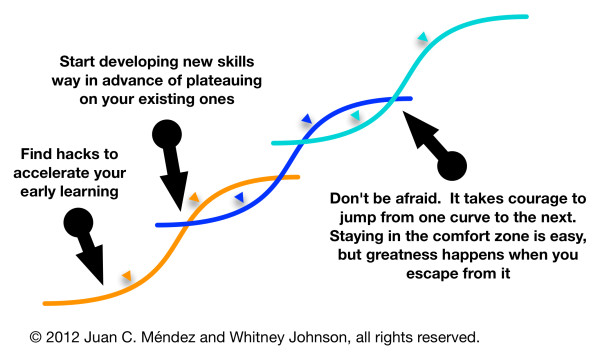I’ve always been a fan of Einstein and like you I’m pretty afraid of dying.
So when I heard that Albert Einstein said “Once you stop learning, you start dying.” I began learning like a maniac.
You see, it’s not enough to just to expect you have what it takes to achieve a new challenge, at your current level of understanding. If want to achieve something that is new to you, you must expect to have to change in order to get there.
Sounds simple right?
Gain a course or get a qualification to say that you can do it. Then go out and do it. Want to start a business? Then all you need to do is gain a business qualification and then it should be easy right?
The truth is that success at anything is never a linear learning curve. You often learn by going two steps forward and one step back. You learn something to get you somewhere, then to get somewhere else involves unlearning some of what you originally learnt.
Successful entrepreneurs understand this and in this post you’ll learn how you can use entrepreneurial learning to achieve what it is that you wish to achieve, with your business or in your current firm.
Linear Learning: The Traditional Route
We tend to think of learning as a linear process. I mean, assuming that you follow the traditional advice that is given on education. This is how we were taught how to learn. We go to school, then college, then we might gain professional qualifications or post-graduate education. We study hard to pass our exams in school so that we can move on to the next year, then so that we can move on to the next, and then the next. We put in hours of preparation, study and commitment to learn course curriculum that is designed to be consumed in this linear fashion. Our education system is very focused on this step-by-step process.
Learn this, then this, then that.
In our education system, information can ONLY be consumed by this linear fashion. To some extent if you had high grades you may be able to move through the system faster, still it is heavily constrained by the rules of the educators. So if you are ready to learn step C, you must wait until the teacher says that you have spent enough time learning step B.
This works to achieve qualifications and standardised learning is the only way to gain certain technical skills required for certain jobs and tasks. It also serves as an effective way to communicate a level of education that you or someone might posses. But what if you are trying to achieve something novel or creative? What if you are trying to achieve something that no-else has done before?
Pressure, Demand and Necessity
When you study at school, you have pressure from parents, teachers and lastly your own expectations. It is these pressures that demand you to learn, and what education is necessary. What is necessary in a formal education system, is learning the appropriate material in order to get to the next step.
The next rung in the ladder.
The next year of schooling or to get to the next education institution. If you are trying to achieve something creative or novel then the pressure and demand for learning is very different. What is necessary for one person is not necessary for everyone and what is necessary for one project is not necessary for another.
“If I had six hours to chop down a tree, I’d spend the first four hours sharpening the axe.” – Abraham Lincoln
Every time who complete a new project and embark on achieving a new goal new skills are required. Learning those skills quickly and effectively is part of being and entrepreneur. When a new project demands a new level of education, it’s now a necessity for the entrepreneur to gain the required education, or at least know enough to hire someone who can complete it for you.
Non-linear learning: Entrepreneurial Learning
When you are an entrepreneur the rules for learning are not the same as formalised education. This is because each time you set a goal to complete a project there is no real rulebook of what to follow. No step-by-step “this will work for everyone” method. Learning as an entrepreneur is requires you to gain knowledge as it is needed. You must learn skills for the current task you are working on.
The difference is, your specific goal or vision that you have defined for your company is now determining the rules for what knowledge must be acquired. Not an institution, not school and not a university. You are now the one steering the ship of your own education. This is the basis for self education. You learn what you can use to achieve what it is you wish to achieve. Not what some else has determined you must learn.

This image created by Mendez, J. C., & Johnson, W. (2012, September 3) shows how entrepreneurial learning works. The levels of learning that you reach are not a linear progression like a formal education.
The Benefits of Entrepreneurial Learning:
A Personal Story
While I completed my full-time study at University, I created my first startup. It wasn’t big, and it didn’t make me millions of dollars but it was an essential component to my own entrepreneurial education.
I truly believe that anyone could have completed their studies like I did. I worked hard, studied late at night and gained my qualification. I achieved good grades, but what I learnt from my startup venture was truly unique.
Yes, starting a creative venture at university was demanding, especially while trying keep up good grades. However, it was the very commitment to the startup which probably gave me the greatest education differentiation coming out of university. I had gained a number of valuable skills that most other graduates did not purely through the experience of launching a real life startup.
I learnt so much about marketing, sales and commercialisation just through running a modest size startup. The reason was that I fully committed to the project. I was willing to learn in order to make my startup work. This mindset forced me to become more creative alongside with gaining a number of practical skills. The same skills that I used to start other ventures, land jobs, build an investment portfolio, and even travel around the world.
There is soo much to gain from experimenting and learning through the experience of running a startup that a university degree seems like a horse and carriage sitting next to a Ferrari.
Results Based Learning
The key skills and mindsets that I gained were not something I can easily write on a CV. The knowledge I gained is not as easy to communicate to others as is my formal qualification, but it is much better than that. It is practical knowledge, life skills to make things happen. Entrepreneurs are different because they see information as a tool to achieve practical and tangible goals. Not to improve their CV or better their reputation.
But what does this mean for you? As every startup, business or creative project requires a different set of unique skills and these mean that you must learn at a rapid pace. If you take on a entrepreneurial role within a firm or as a entrepreneur you will need to learn, and learn fast.
I want you to begin to benefit from self education in the form of entrepreneurial learning as well. It has brought me some amazing opportunities and I believe I am a better person because my startup experiences. So let’s look at how you can begin to learn fast like an entrepreneur.
How to get started.
- The first step is to have a clear vision of what you want to achieve with your business, project or current job. You won’t know what you need to learn if you don’t know where you are going.
- Second, let that achieving that goal or purpose determine your criteria for what you must learn. Entrepreneurial learning is practical learning, so learn what you need to learn so that you can do what you do better.
- Third, use resources. You don’t need to enrol in formal course to gain knowledge. For practical purposes you can begin to read books, watch videos on youtube, listen to podcasts and frequent seminars and workshops. There is so much information freely available that you can gain information on how to do anything from social media marketing to product distribution and delivery logistics.
- Forth, forget about the need to quantify your learning. The only purpose is to do what you do better, don’t think about how to add it to your CV or how learning something will improve your professional reputation. Keep the end goal in mind and track your education progress in terms of process orientated goals rather than results based goals. There is no point reading 10 books on sales if you can learn the basics and know enough to hire someone who can be a sales rep for you. Learn what you need to achieve what you have decide you wish to achieve.
- Fifth, continue learning. Entrepreneurial learning is not a one off event such as getting a qualification. Learning is a commitment to continually gain new knowledge. Entrepreneurs know that if they want to keep moving forward they need to change the oil regularly and keep learning new things. Learning is a process that continues as long as you wish to keep moving forward.
I hope this is helpful and changes up your way of looking at education. The basis of entrepreneurial education is to learn to produce practical results, not qualifications. If you remember that and apply entrepreneurial learning you will achieve great results.
If you have any questions you would like to ask on how to learn like an entrepreneur please comment below or if you would like a free private consultation feel free to contact me, here.
Image Source: Mendez, J. C., & Johnson, W. (2012, September 3). Throw Your Life a Curve. Harvard Business Review. Retrieved June 30, 2014, from http://blogs.hbr.org/2012/09/throw-your-life-a-curve/
Become an ECO founder
Start the 30 day ECO founder Challenge (it’s free!) to learn how to startup your own clean technology business.
No spam, ever. You can unsubscribe at anytime.



Pingback: Top 3 Traps to Avoid In Your Business Pitch - Eco Founder()
Pingback: Lessons Learnt from a Cleantech Event - Eco Founder()